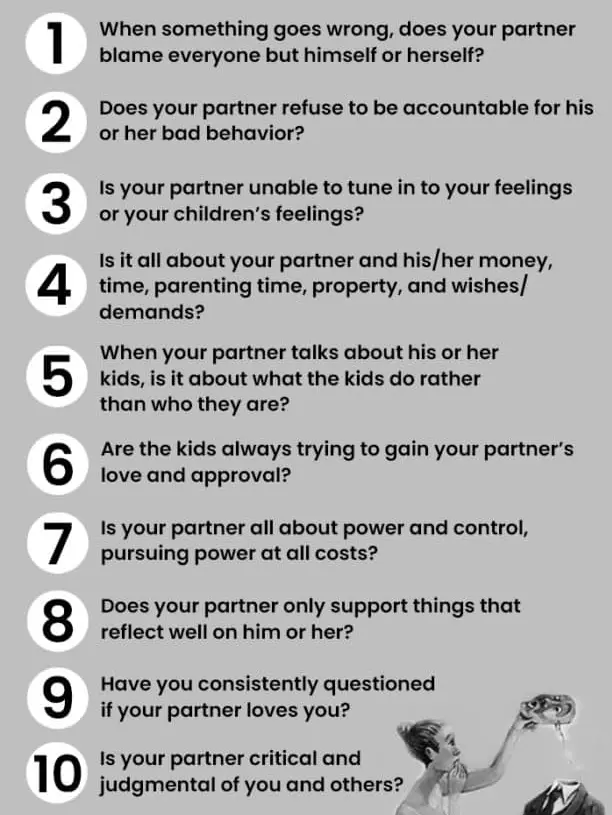Narcissism, which means having a lot of faith in yourself and not caring about others, can hurt your health and relationships. Finding out the 12 traits of a narcissist can help you understand why they do the things they do. The root cause can come from genes, stressful events in childhood, or cultural factors. And there's a link between narcissists and cheating. If you break these habits and figure out why they happen, you can improve your relationships and grow.
Part 1. 12 traits of a narcissist
Here are 12 traits that someone is a narcissist that will help you spot and deal with their behavior. People can deal with narcissists better and find good ways to deal with things and make their relationships better if they know these traits.
1. Arrogance
A lot of the time, narcissists act cocky and full of themselves. Narcissists think they are better than other people and have a skewed view of themselves. When they treat others badly, they often insult or put down people they think are less important than them. Their belief that others are not as good as they are makes it hard for them to connect with others in a real and fair way.
2. Easily jealous
Narcissists often feel envious of other people, especially when those other people have the qualities or successes that they want. People who feel this way of jealousy often get angry, which can make them act mean. Narcissists may hurt or put down other people to make themselves feel better when they don't think they're good enough and to protect their low self-esteem.
3. Showing indifference to others
People who suffer from narcissistic symptoms don't always think about how other people feel or what they want. Narcissists need to know what they want and need. They don't always care or believe what other people are feeling or going through. This lack of care can make them seem heartless and cold, hurting their relationships at work and home.
4. Lack of empathy
The ego is based on a deep lack of compassion. Being a narcissist makes it hard to connect deeply with other people because they don't understand or relate to how they feel. When someone doesn't have empathy, they are insensitive and don't care how their actions affect others. This behavior often causes harm or hurt.
5. Lack of responsibility
Narcissists don't want to take responsibility for what they do. They quickly blame someone else when they fail or make a mistake. Because they aren't held responsible, they can't learn from their mistakes. This keeps them stuck in a cycle of defense and denial.
6. Lack of introspection and self-criticism
They don't know how to think about or judge themselves constructively. It's common for them not to see their flaws and problems. They can't see what's happening inside, so they don't change their bad habits or learn from them, making them feel bad about themselves.
7. High vanity and sense of superiority
When someone is narcissist, they believe they are better than everyone else. They put too much stock in how they look and what they've done and often lie about how important those things are.
8. Excessive seeking of praise and approval
People who are narcissists always need to be praised and liked. Everyone loves them and will do anything to get praise and help. Narcissists also act in ways that earn respect. This need for approval from others comes from low self-esteem and needing help to stay strong.
9. Autocratic
Narcissists want to oversee and direct other people. They expect people to do what they say without question, whether at work or in their personal lives. When they are bossy, people around them might get mad and upset.
10. Exploits others
Narcissists utilize other people to get what they need. Their relationships are seen as ways to reach their objectives, and they frequently lie or trick others to get what they want. Targeted abuse can cause a lot of pain and can ruin relationships and trust.
11. Exaggerated fantasies
This type of person often have big dreams about how successful, powerful, smart, or beautiful they are. These unrealistic dreams allow them to avoid reality and boost their inflated sense of self-worth. On the other hand, these ridiculous goals can make people sad and angry when they are not met.
12. Fragile self-esteem
They may act like they are proud and sure of themselves, but narcissists don't think much of themselves. If someone criticizes them, they may get defensive or angry because their sense of self-worth is at risk. Their haughtiness often hides the fact that they don't think much of themselves, making them seem more sure of themselves than they are.
Part 2. What causes someone to become a narcissist
Being narcissistic is a complicated personality trait that has roots in many areas of psychology, biology, and society. Realizing what causes narcissism can assist you in managing it and lowering its impacts. The following are some of the main things that make people selfish:
- Genetics
Most of the time, narcissism is passed down through genes. Research shows that some traits people are born with may make them more likely to act narcissistically. Personality traits like being outgoing, careless, and angry, which are often linked to narcissism, can be changed by distinct DNA.
Also, Twin studies have shown that genetic factors account for approximately 50% of the variance in narcissistic personality traits. This means that genetics play a substantial role in determining the likelihood of developing traits associated with narcissism.
- Childhood trauma
Abuse in childhood, whether it's physical, mental, or sexual, can be a trigger for the formation of a narcissist. Traumatic events that occur at a young age can lead to problems with self-worth and emotional control. When children experience these types of traumatic events, they may resort to selfish ways to protect themselves from feeling weak and helpless. They try to protect themselves from hurt and rejection by showing that they are better and more independent.
- Overindulgent or indulgent parents
There is a big difference between parenting styles and how a child grows up and develops. Kids are more likely to become a narcissist if their parents spoil them too much. Children are more likely to become selfish if they are always praised but do not learn to care for others, take responsibility or see things from others' perspectives.
- Influence of social environment and culture
The social and cultural environment in which a person grows up can also greatly influence becoming a narcissist. In places where there is a strong emphasis on self-improvement and success, people may develop selfish and narcissistic personalities as they try to live up to these standards. And social media and the Internet have exacerbated this problem.
Part 3. Discussion of narcissist and cheating in relationships
Are narcissists more likely to cheat in a relationship? The answer is yes. Due to their inflated sense of self-importance and constant need for approval, they seek approval from people other than their main relationship. In relationships, the person involved often thinks they are entitled to get what they want without thinking about what might affect their partner.
Not caring about other people's feelings or having empathy lets them cheat without feeling bad about it. Furthermore, narcissists are drawn to new and exciting experiences, which can include having affairs with other people.
Because of their low self-esteem, they constantly seek approval and attention from many places, making their behavior worse. When this happens, their need for constant praise and approval takes precedence over staying faithful in a relationship.
How to tell if your partner is a narcissist? You can observe his daily behavior and think about whether he shows any signs of abnormality. If your partner is a narcissist, help him seek active treatment. If you are considering leaving your narcissistic partner in the event of an affair, discuss your decision with a mental health professional or someone close to you.
Because these people with narcissistic traits will often try to manipulate finances, children, or other factors against you to force you to stay with him, it is very important to have a plan to keep you safe during this period.
Part 4. How not to be a narcissist
Mild narcissism is probably present in most people. But when narcissism reaches a certain level, it's a disease. To avoid becoming an extreme narcissist, you can take the following measures.
- Develop a healthy Self-Perception
A reasonable self-discernment recognizes the two qualities and shortcomings. Center around inner approval as opposed to looking for consistent outside endorsement. For example, rather than depending on online entertainment to feel much better about yourself, participate in exercises that make you really blissful and satisfied. Perceive your actual capacities and self-esteem without misrepresentation, and take a stab at ceaseless personal growth in view of reasonable self-evaluation.
- Develop empathy and concern for others
Compassion includes understanding and discussing the thoughts of others. To develop compassion, practice undivided attention and connect really with others' encounters.
For example, on the off chance that a companion is going through a difficult stretch, rather than offering shallow exhortation, find an opportunity to figure out their feelings and proposition certified help. Chipping in at neighborhood havens or public venues can likewise upgrade your compassionate capacities by presenting you to different educational encounters and viewpoints.
- Accepting criticism and learning from it
Useful analysis is an important instrument for self-awareness. Rather than responding protectively to criticism, view it as a chance for development. Ponder the criticism, recognize regions for development, and roll out fundamental improvements.
For instance, in the event that a partner brings up a slip-up in your work, recognize it, gain from it, and try not to rehash it later on. This approach helps fabricate versatility and flexibility, prompting proficiency and self-improvement.
- Maintaining humility
Lowliness includes perceiving and valuing the commitments and accomplishments of others. Practice lowliness by commending others' accomplishments and conceding your errors. For instance, in the event that a colleague thinks of a good thought, recognize their commitment transparently. At the point when you commit an error, own ready and gain from the experience.
- Invest time and energy in developing personal qualities
Center around self-awareness by creating characteristics like consideration, respectability, and strength. Participate in exercises that test and improve you. For instance, take up another side interest that requires tolerance and determination, like learning an instrument or dominating another game. These exercises encourage self-awareness and give a feeling of achievement, assisting you with building a balanced character.
- Develop authentic social relationships
Valid connections are based on trust, regard, and certified association. Put time and exertion in shaping significant bonds. For example, rather than systems administration exclusively for individual increase, look to construct connections in view of common interests and shared values. Show real interest in others' lives and proposition support when required.
- Keep an open mind
A receptive outlook is fundamental for self-improvement and sound connections. Embrace different points of view and change your perspectives in light of new data. Remaining inquisitive about your general surroundings advances development, flexibility, and a more extensive comprehension of life.
- Seeking therapy
Proficient treatment can give significant bits of knowledge and techniques to conquering self-centered inclinations. A specialist can assist you with investigating basic issues, foster better survival techniques, and fabricate more certain connections.
For instance, through mental social treatment (CBT), you can figure out how to challenge and change destructive ideas and ways of behaving. Treatment offers a place of refuge to address and deal with egotistical ways of behaving, prompting long haul self-awareness.
Part 5. FAQs
Q1. What are the 7 signs of a female narcissist?
- Excessive Vanity: Preoccupied with appearance and physical attractiveness.
- Need for Admiration: Constantly seeks validation and praise from others.
- Sense of Entitlement: They believe they deserve special treatment and privileges.
- Manipulative Behavior: Uses others to achieve personal goals.
- Lack of Empathy: Inability to understand or care about others' feelings.
- Jealousy: Envious of others' successes and achievements.
- Superficial Relationships: Maintains relationships that enhance their self-image rather than genuine connections.
Q2. How do narcissistic wives treat their husbands?
Narcissistic wives often boss and control their husbands. They don't care about what their partner needs and put their own wants ahead of those needs. They may be mean, critical, and rude, which makes their guys feel like they are not important or respected.
Q3. How to manipulate a narcissist?
Using an ego to get what you want is usually wrong and hurtful. If you need to, knowing they must be admired and accepted can help you handle relationships with them. Making them feel important and appealing to their ego can change their behavior quickly, but it's not a long-term fix.
Q4. What is the number 1 narcissist trait?
The most important trait of a narcissist is a strong feeling of self-importance. This shows up as pride, a sense of entitlement, and a constant need for approval and praise, which drives many of their other behaviors.
Part 6. Conclusion
Narcissism can stem from factors such as genetics, childhood trauma, overly controlling parents, and socio-cultural factors. Overcoming narcissism is a long-term process, and attempting to understand these traits can help you detect and deal with narcissistic behavior in a timely manner. Understanding the feelings of others and building authentic relationships with people can reduce the link between narcissists and cheating.













